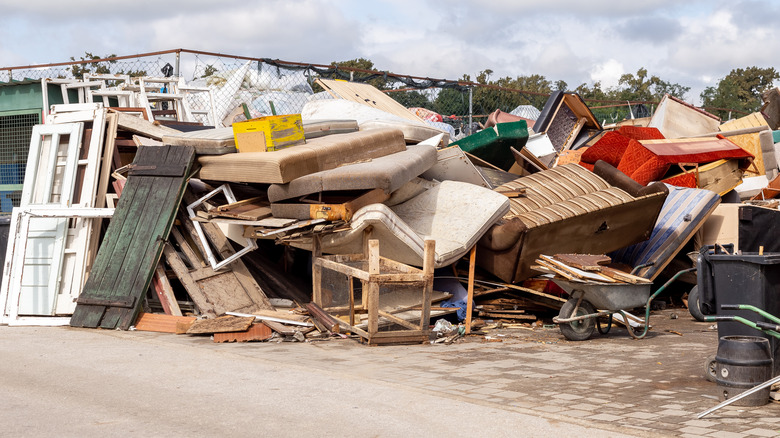Tired Of Thrift Store Crowds? This Alternative Is A Hidden Gem & A Vintage Lover's Dream
Buying things secondhand is a tried-and-true method for finding deals on vintage items and unusual gems you might not be able to afford otherwise. And if you're like many budget-minded people, when it's time to go thrifting, the neighborhood secondhand store counts among the first stops you make. However, buying secondhand means more than just a stop at Saver's, and according to Yelp, this "extra-secondhand-store" shopping trend has gained traction in 2025. There has been a 33% increase in searches for antique markets. Searches for salvage yards went up by 42% during the same time period.
If you haven't explored these budget renovation hacks before, you may benefit from a lesson in semantics before proceeding further. Let's start with antique markets. There is a bit of a gray area as far as definitions are concerned. Sometimes, antique markets are confused with flea or farmer's markets. Suffice it to say that antique markets lean toward selling items that are at least vintage or retro. That is, they're at least 20 years old. However, for something to be considered antique, it must be at least 100 years old.
At flea and farmer's markets, you might find vintage and antique items. You may also find more modern wares, including junk. These retail spaces are often temporary. For example, you'll find a big flea market event being held in a building at the local expo grounds over the course of a long weekend. Antique markets and malls, on the other hand, often have more permanent places of residence. In other words, you can visit them year-round because, like the secondhand stores you're used to, they have a permanent address.
What are salvage yards?
If you were to do an unfiltered Google search for "salvage yards," chances are you'd end up with results for secondhand automobile parts. Once you dig deeper, you'll hit the kind of pay-dirt that makes you glad you're persistent. Another similar term that's searched for is the scrap yard, which is where you'll find old appliance parts as well as pieces of scrap metal you can use. This can be a useful place if you're trying to repair something in your home, like an old vintage fridge you don't want to part with.
However, it's likely that the kind of salvage yard you may be looking for is a place where you'll find cast-off architectural elements, like pieces of wainscoting, old doors and windows, flooring, and old bricks or wood to use in home construction and renovation. You'll nab pieces of furniture and decor accents there, too.
While some of the items may have been sorted to weed out stuff that really is junk, this isn't always the case. In light of this, you need to be prepared to go on a bit of a treasure hunt when you're at a home salvage yard. For example, dress comfortably and don't be averse to wearing gloves as you dig. Plan to renovate and decorate on a budget and know what that budget is. Get an idea of what types of items you'll be looking for, though be open to finding some unexpected gems, too. And if you're lucky, you'll find a place that allows you to haggle a bit for better pricing. Just be respectful about it when you do.
Tips for finding these vintage secondhand stores
Usually, these outfits advertise. And if they happen at regular intervals throughout the year, like the Treasure Valley Flea Market in Idaho does, bargain shoppers will come to expect them. There are also online directories that tell you where to find salvage yards, like the Architectural Salvage and Lumber News.
And of course, search engines, like Google, are only too happy to provide you with info about antique markets or home salvage yards. If you go this route, home-and-garden-related keywords must be a part of the search terms you use — i.e. "home salvage yards near me" or "architectural salvage yards in [name of city]." Without the home-related keywords, you're likely to end up with auto salvage yard results instead. Other places to look include social media. Search these sites using keywords, just as you would with Google.
Contractors and junk haulers may also be places you can find info about salvage and antique markets. In the former case, the contractors themselves may shop there to find deals on building materials. In the latter case, the junk hauler may use these outfits as repositories for the items they've picked up for disposal. (Not all items that go to the junk hauler are hopeless cases.) If you're persistent enough, you're likely to find more than one place to buy still-good secondhand items that would work great for your next DIY home improvement projects.


